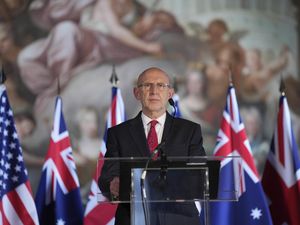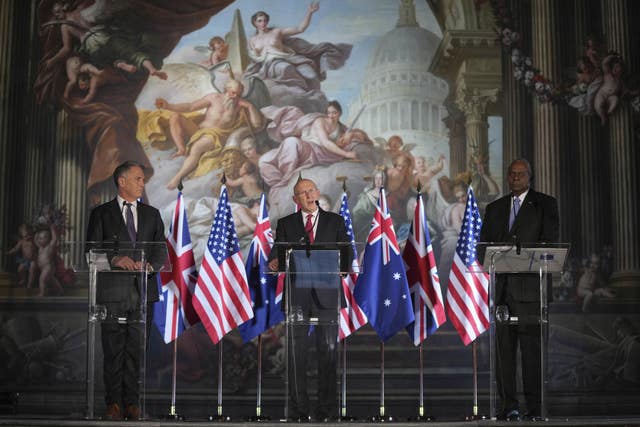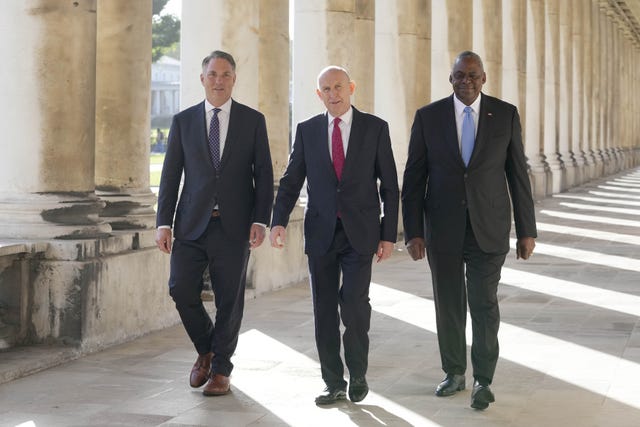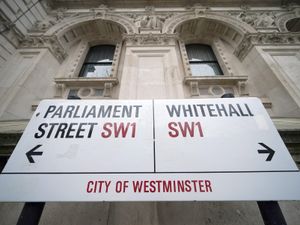UK and Australia to begin negotiations on treaty for nuclear submarine programme
UK Defence Secretary John Healey said that the bilateral agreement between the two Aukus nations would ‘bind’ the alliance into law.

The UK and Australia are to begin discussions on a formal treaty between the two countries as part of their own nuclear submarine programme.
UK Defence Secretary John Healey said the bilateral agreement would “bind” their alliance into law. They form two-thirds of the security partnership with the US, which was established in 2021.
Mr Healey said he hoped it would mean the alliance would “endure for decades”.
Speaking alongside Australian deputy prime minister Richard Marles and US Secretary of Defence Lloyd Austin, he said: “I can announce that deputy prime minister (Richard) Marles and I have agreed that negotiations will soon be under way for a new bilateral treaty to bind our Aukus collaboration into law.

“So this not only reflects our commitment to secure a secure Indo-Pacific region where international rules are respected, it also sends a very strong message that our defence alliance is one that will endure for many decades to come.”
The meeting on Thursday represented the first time defence ministers from the three Aukus nations had met together outside the US.
The UK and Australia are working on their joint submarine project, known as SSN-Aukus. It is hoped that the nuclear powered fleet submarines would enter service in the late 2030s in the UK and early 2040s for the Australian Navy.
Mr Healey said the UK has already trained 250 Australian naval personnel in how to operate, maintain and regulate nuclear powered submarines. He announced the UK had agreed to train hundreds more.
He added the UK had agreed to add UK-made Sting Ray torpedoes to P8-A submarine hunting aircraft, which target deep diving and conventional submarines.

Nearly £10 billion has been earmarked for spending on UK nuclear infrastructure and the nuclear industry since the formation of the Aukus partnership.
The funds include £3 billion for factories in Barrow-in-Furness and Derby.
During the project to build the attack submarine, it is forecast that more than 21,000 people will be working on it at UK sites, with the work generating an additional 7,000 skilled roles.
At a press conference at the Old Royal Naval College in Greenwich, which was home to the Royal Navy’s initial nuclear reactor training 60 years ago, he said: “Firstly our investment in this partnership helps our industries to prosper and breaks down barriers to trade.
“Secondly, the skills and experience that we share boosts jobs and boosts growth across our nations.
“And third the investment in our future technologies helps drive innovation and will help develop new warfighting capabilities.”
The Labour minister refused to say whether the UK would “go it alone” and give Ukraine permission to use long-range Storm Shadow missiles inside Russia without the US’ permission.
He said: “There really is only one person that benefits from the public debate about specific capabilities, and that’s President Putin.”
He had earlier said: “The main focus for the discussions between secretary (Lloyd) Austin and I this morning over Ukraine were how we get behind the victory plan that President Zelensky has presented in the US this week, and how we can reinforce the Ukrainian’s position in the months ahead in the face of an ongoing onslaught from the Russians on the eastern border.”
Mr Healey had earlier told the press conference: “We have held these discussions under a cloud of growing global insecurity.
“So in our trilateral and in our bilateral meetings, we’ve reinforced the need to stand together against Russian aggression, towards peace in the Middle East and steadfast behind Ukraine for as long as it takes.
“In serious times you need serious partners. So Richard (Marles), Lloyd (Austin), we in the UK stand shoulder to shoulder with you and we will drive the Aukus partnership from strength to strength.”





